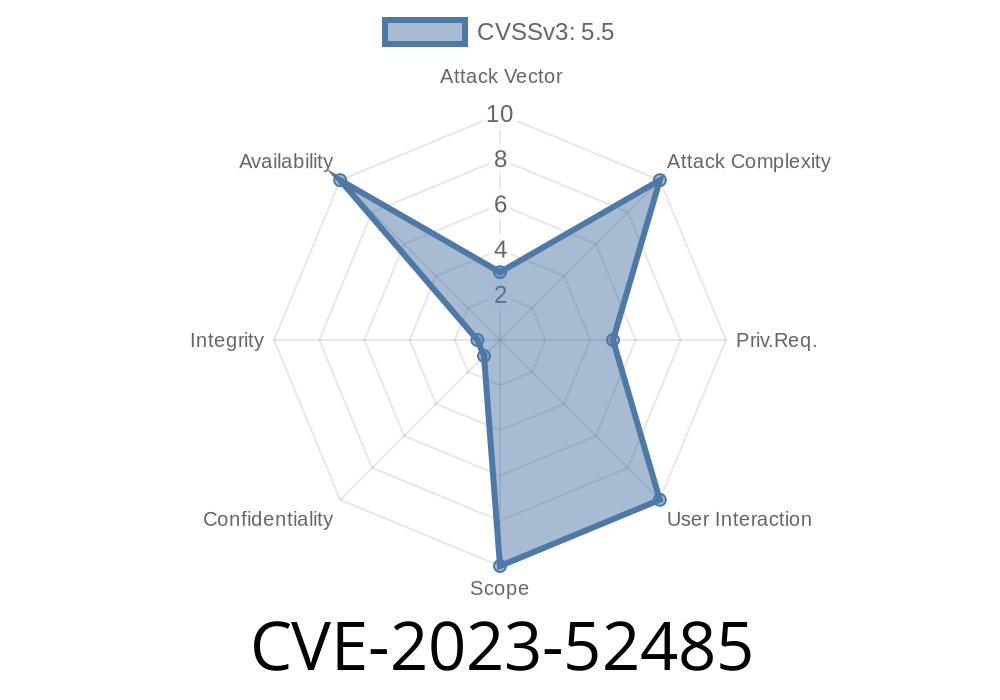CVE-2023-52485 is a recently addressed vulnerability in the Linux kernel’s AMD GPU driver subsystem, specifically within the Display Microcontroller Unit (DMCUB) handling logic. If left unpatched, this bug made it possible to hang the system when commands were sent to an unpowered device, possibly leading to unresponsive behavior or even local denial-of-service situations. In this long read, we explain what happened, how attackers might take advantage, how it was fixed, and what you should do.
What is the DMCUB in AMD Display?
The DMCUB (Display Microcontroller Unit Base) is a microcontroller in modern AMD GPUs responsible for power management and display command processing. It sometimes goes into an “idle” or powered-down state to save power.
When a user, or a process, tries to send a command to the DMCUB while it is still asleep, the expected behavior is to first wake it up. Failing to do so can lead to the system freezing while it waits on a result that will never come.
CVE-2023-52485: The Precise Issue
Reference:
- Kernel commit fixing CVE-2023-52485
The affected code was in functions that interact with the DMCUB. If a command is sent to the DMCUB while it is off, the calling code can hang, waiting forever for an answer. This is especially risky during display power optimizations and sleep/wake cycles.
What Causes the Hang?
Let’s look at an over-simplified code example (stylized for clarity).
void send_command_to_dmub(struct dmub_context *ctx, struct command *cmd) {
if (!dmub_is_powered_on(ctx)) {
// Previously missing: wake up DMCUB
}
dm_execute_dmub_cmd(ctx, cmd);
}
Insert checks and a proper wake-up before sending commands.
- Calls to dm_execute_dmub_cmd are always wrapped in logic that brings DMCUB out of idle mode if necessary, and then returns it to idle state after.
Exploitability & Attack Surface
While this bug is not a classic “remote code execution” or privilege escalation, it could be exploited locally:
Local DoS (Denial of Service):
- Any unprivileged process able to trigger certain display power state changes or command queues (e.g. via X server, GUI toolkits, or specific ioctl() calls) could intentionally force the race, causing all or part of the system to hang.
Exploit Example
While the bug is subtle, here’s a pseudo-exploit (for educational purposes only). Tools that manipulate the GPU power state (during suspend/resume cycles, or intensive display reconfiguration) can be used.
Userland exploit outline
// Pseudo code, requires root or special group (video)
int drm_fd = open("/dev/dri/card", O_RDWR);
// Force rapid sleep/wake cycles
for (int i = ; i < 100; i++) {
drmSetMaster(drm_fd);
set_display_power_state(SUSPEND); // triggers DMCUB to go idle
usleep(500);
set_display_power_state(RESUME); // triggers DMCUB wake commands
}
// Attempt to send command immediately after suspend
ioctl(drm_fd, DRM_IOCTL_AMDGPU_SOME_CMD, &my_req);
// System may freeze if the race is hit
Note: Exact APIs and commands depend on kernel/driver version.
How Was It Fixed?
Main Patch Logic:
- For every function that executes commands within the DC context (display core), wrap the command submission with code that disables idle/low power optimizations (wakes DMCUB), and reenables them on success.
- For Direct Management (DM) submissions, they handle the enter/exit manually.
Key Patch Excerpt
bool dc_execute_dmub_cmd(...) {
dc_exit_idle_optimizations(dc);
ret = dm_execute_dmub_cmd(dc->ctx, cmd);
dc_allow_idle_optimizations(dc);
return ret;
}
The above ensures the microcontroller is active for every command. Deadlocks due to nested calls are avoided.
See the fix here:
- Upstream Linux patch
Recommendations
- Update Your Kernel: Install a Linux kernel release that includes the fix for CVE-2023-52485. Most major distributions have released patched versions as of Q1 2024.
- For sysadmins: Don’t allow untrusted code to execute with access to /dev/dri/* or similar device files.
References & Further Reading
- Linux Kernel Patch for drm/amd/display: Fix for DMCUB Wake Issue
- AMD GPU Linux Driver
- NVD page on CVE-2023-52485 (link may be pending population)
- drm/amd/display subsystem docs
Conclusion
CVE-2023-52485 highlights how even “simple" race conditions in power management can have outsized, user-facing consequences. Race conditions that lead to live-locks or deadlocks in kernel mode are particularly dangerous, as they often result in system instability or downtime. The proactive kernel patch ensures stable and predictable display handling for all Linux users.
If you manage Linux machines running graphical workloads on AMD GPUs, make sure you are running a patched kernel now.
Timeline
Published on: 02/29/2024 15:15:07 UTC
Last modified on: 01/09/2025 20:20:59 UTC
